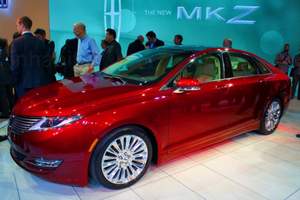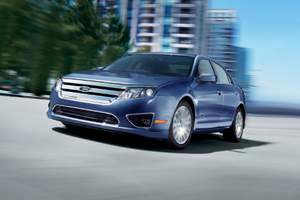
“Hybrid” has become a magic word that’s synonymous with fuel economy for many car buyers, thanks mainly to the Toyota Prius. The common assumption is that the hybrid version of a car will deliver great fuel economy–or at least better mpg than a comparable gas version, resulting in a more economical vehicle to own. While the fuel economy part of that line of thinking is correct, as you probably know, the total cost of owning a vehicle is much more than the cost of the fuel you put in it. In fact, according to some analysts, the fuel portion of vehicle ownership is only about one-fourth to one-fifth of the cost of owning a vehicle. It’s a higher percentage for non-hybrid models (27 percent compared to 20 percent for hybrids on average) according to the Michigan-based automotive analyst organization, Vincentric.
That company looked at 36 hybrid models from 2012 and 2013 (and 12 trim levels within those models) and their conventional counterparts and found that when you look beyond fuel economy to the initial cost of the vehicle and expected depreciation, not all hybrids delivered a lower cost of ownership. They found the incremental cost of a hybrid car or truck to be on average $5,285 more than a conventional model. The good news is that cost differential has gone down by more than $3,000 compared to Vincentric’s similar comparison last year. Hybrids make up some of that cost differential by having better residual values (the value of a car at the end of a lease or ownership, in this case after five years) and of course deliver great savings in fuel costs. But overall, hybrids, again on average, during a five-year, 100,000 life will cost $1,582 more than a non-hybrid model.
Cost of Ownership Lower For Some, But Not All
In spite of those discouraging numbers, hybrids continue to increase their popularity and Vincentric found that among the 36 models, some did deliver better total cost of ownership than conventional models. Some did not, including the Honda Civic Hybrid, Toyota Prius Liftback (the best-selling hybrid) and some models of the popular Ford Fusion Hybrid.

Vincentric made the comparison based on heavy use, typical of commercial fleets, assuming 20,000 annual miles drive over five years. As well, they took into account depreciation, financing, fees and taxes, fuel, insurance, maintenance and repairs.
What you will notice in this compilation is that some of the more expensive luxury hybrids ended up delivering better value because of the significance of the fuel savings as well as higher residual value. Of note is how some of the most popular hybrid models fared–the three Prius models (c, Liftback, V). The problem with these three is there are no exact comparable models, so Vincentric compared the Toyota Prius c to the Toyota Yaris (on which it is based), the Liftback to a Corolla and the Prius V to a Matrix. In order, after five years, the c cost $624 less than the Yaris while the Liftback cost $1,823 more than the Corolla and the V did the best of the three, coming in at $1,707 less than the Matrix.
So, here are 10 models that Vincentric said will deliver the best return after five years. These are the hybrids that actually will save you money in the long run.
Top 10 (*good comparison car, i.e., a non-hybrid version of the same model)
*2012 Lincoln MKZ Hybrid (which is offered at the same price as conventional MKZ)
*2012 Mercedes-Benz S-Class Hybrid S400HV
*2013 Porsche Panamera Hybrid S
2013 Lexus HS 250h (now out of production)
*2013 Toyota Avalon Hybrid XLE Premium
*2013 Lexus ES 300h
*2012 Ford Fusion Hybrid (not as good in 2013)
2013 Honda Insight
*2013 Toyota Highlander Hybrid
2012 Toyota Prius V
The range of savings among the Top 10 is fairly large, from $6,402 for the Lincoln MKZ to $1,707 for the Prius V. Spread out over five years, the Prius V savings equal a little more than $340 a year, or a little less than a $1 a day. The glass half full version of that is: You’re saving money every day. That’s what hybrids have promised and many deliver. The promise is even more will deliver better savings in the future as the incremental cost of hybrid systems continue to drop due to improvements in technology and increased production.
For more articles on this subject, check out:
The Top 10 Best-Selling High-MPG Cars in May 2013
Microhybrids Are Big MPG Boosters, Report Says
The Top 10 2014/2013 AWD & 4WD SUVs/Crossovers With the Best MPG
